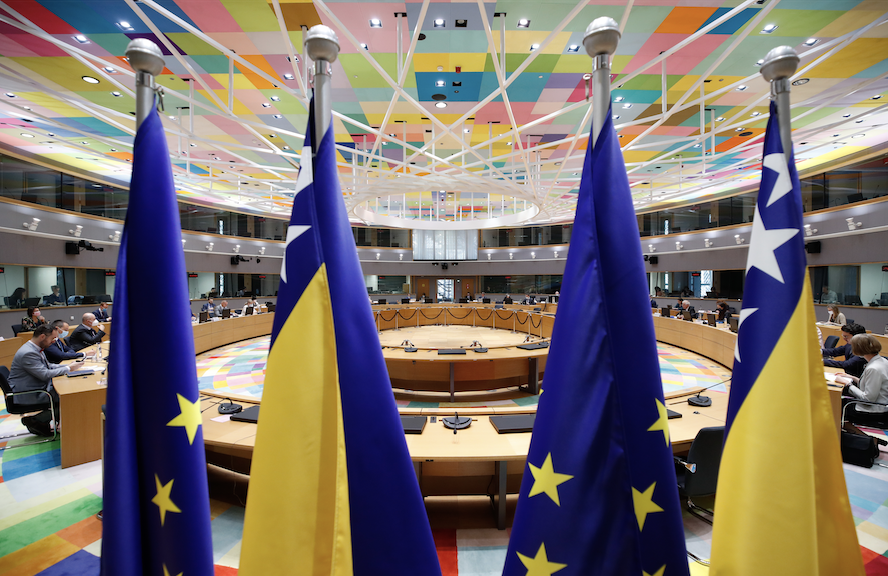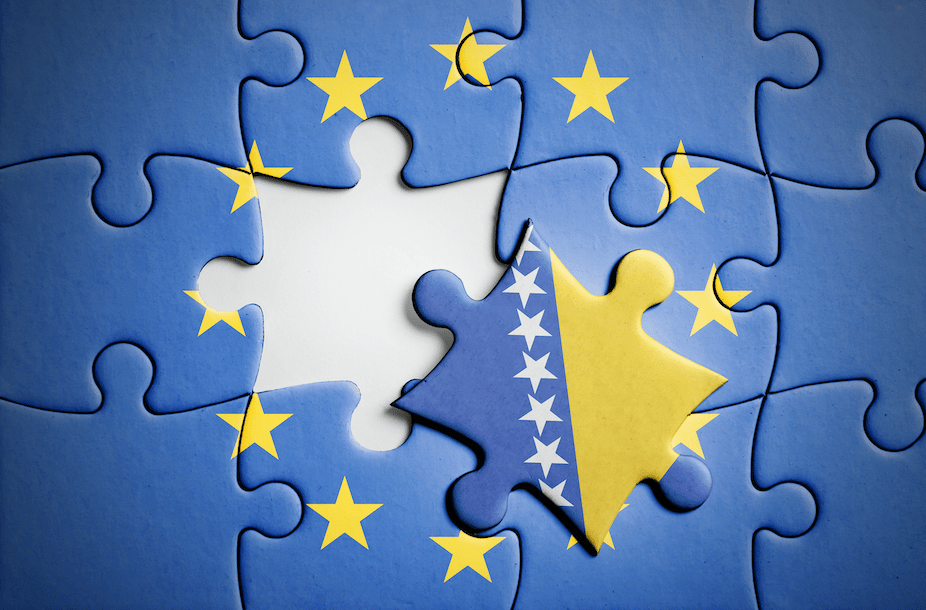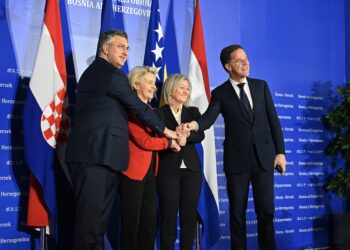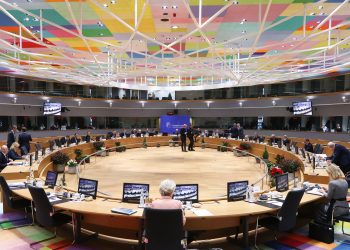Brussels – A quarter of EU member states are moving decisively to support Bosnia and Herzegovina on its path toward the European Union, just days before a European Council meeting that could be the last call for Sarajevo’s ambitions to speed up the accession process. For the occasion, the group Friends of the Western Balkans, comprising the seven most open-minded member states for the immediate integration of the Balkan countries of the region — Italy, Austria, Croatia, the Czech Republic, Greece, Slovakia, and Slovenia — is back on the move. “We believe it is essential to seize the momentum and the current window of opportunity and decide to open accession negotiations with Bosnia and Herzegovina.” reads a letter–obtained by Eunews–sent by the respective foreign ministers (Raffaele Fitto for Italy) to the Belgian rotating presidency of the EU Council, their 20 other colleagues, and the Commissioner for Neighborhood Policy and Enlargement Olivér Várhelyi.
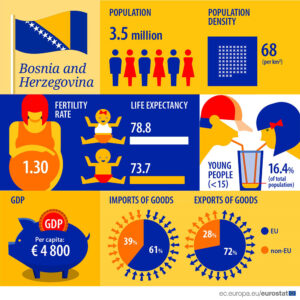 The letter came just days after the European Commission recommendation to open accession negotiations with Sarajevo, given its “impressive steps towards us” (words of EU Commission President Ursula von der Leyen before the Strasbourg hemicycle) and the resulting achievement of the required levels of compliance with membership criteria. “Bosnia and Herzegovina has achieved more substantial reforms in recent weeks and months than in previous years, and work on further reforms is ongoing,” the seven ministers stressed, recalling the decision taken during the December European Council to start accession negotiations “once the necessary degree of compliance with the accession criteria has been achieved.” Examples of progress are evident, the letter reports: the adoption of amendments to the Law on the Ombudsman, Freedom of Information and Foreigners, the adjustment of the Law on the Supreme Judicial Council, and – more recently – the adoption of the Law against Money Laundering and Countering the Financing of Terrorism, Conflict of Interest and amendments to the Civil Service Law, as well as the green light for negotiations on the status agreement with Frontex and the EU Integration Program.
The letter came just days after the European Commission recommendation to open accession negotiations with Sarajevo, given its “impressive steps towards us” (words of EU Commission President Ursula von der Leyen before the Strasbourg hemicycle) and the resulting achievement of the required levels of compliance with membership criteria. “Bosnia and Herzegovina has achieved more substantial reforms in recent weeks and months than in previous years, and work on further reforms is ongoing,” the seven ministers stressed, recalling the decision taken during the December European Council to start accession negotiations “once the necessary degree of compliance with the accession criteria has been achieved.” Examples of progress are evident, the letter reports: the adoption of amendments to the Law on the Ombudsman, Freedom of Information and Foreigners, the adjustment of the Law on the Supreme Judicial Council, and – more recently – the adoption of the Law against Money Laundering and Countering the Financing of Terrorism, Conflict of Interest and amendments to the Civil Service Law, as well as the green light for negotiations on the status agreement with Frontex and the EU Integration Program.
A green light at the Council meeting scheduled for Thursday and Friday (March 21-22) would allow Bosnia and Herzegovina to “set out firmly on the path to the European Union.” If not, “it would weaken the role of the EU in the Western Balkans and send a negative message to the entire region, to which we promised that its future lies within the EU more than 20 years ago,” warn the Friends of the Western Balkans. While waiting for the latest draft of the EU leaders’ summit conclusions, for now, Chapter 4 on ‘Enlargement and Reforms’ still seems to be empty, “pending the text.” But the warning had already come during von der Leyen’s end-of-January trip to Sarajevo with the prime ministers of Croatia, Andrej Plenković, and of the Netherlands, Mark Rutte. “After March, the year will be full of issues such as elections and the new configuration of the Parliament and the Commission,” the number one Union executive had said, confirming the even more explicit words of Croatian Prime Minister Plenković: “If we miss the opportunity in March, the rest of the year will be lost, and it will almost certainly end in January 2025.”
Bosnia and Herzegovina’s EU accession path
Bosnia and Herzegovina’s journey towards the European Union began on February 15, 2016, with the official submission of its membership application. For over six years, no positive response came from the EU institutions because of the country’s near-disastrous situation on the base conditions (Copenaghen criteria) for being considered a formal candidate. However, over the past two years, signs of confidence have intensified, especially from the EU executive and its president also considering the risks of Russian destabilization of a very delicate country and region in the heart of Europe. 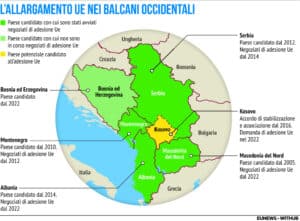
At the presentation of the 2022 Enlargement Package, the Commission recommended to the Council to grant Bosnia and Herzegovina candidate status for EU membership, with a particularly passionate speech in Sarajevo by von der Leyen during her trip to the Balkan capitals to announce Brussels’ energetic support. After assessing the Commission’s opinion, the summit of EU leaders on December 15, 2022, gave the green light to grant Bosnia and Herzegovina the status of candidate country for EU membership while emphasizing the need to implement crucial reforms in the areas of rule of law, fundamental rights, strengthening of democratic institutions, and public administration.
After becoming the eighth candidate country for accession in the EU enlargement process, Bosnia and Herzegovina has continued to push on its path to the Union. Thanks to the (albeit limited) progress made by Brussels in the 2023 Enlargement Package, the EU Commission decided to include a recommendation to the European Council to launch accession negotiations for Sarajevo “once the necessary degree of compliance with the accession criteria has been achieved.” In other words, the recommendation is there, but with a foregone conclusion that the leaders’ summit response would await new positive news on the front of the 14 priorities outlined by the Commission (of which only two completed). That’s how it went at the last European Council in December, with the decision to start negotiations with Bosnia and Herzegovina without indicating an actual start date.
The Republika Srpska hurdle
Yet the path of Bosnia and Herzegovina’s rapprochement with the Union is made particularly difficult by the president of Republika Srpska Milorad Dodik, who has championed a secessionist project since October 2021. The goal is to remove the region from central state control in such crucial areas as the military, tax system, and judiciary, more than 20 years after the end of the ethnic war in Bosnia and Herzegovina. The European Parliament has called for economic sanctions. After the harsh condemnation of secessionist attempts by the Serb-majority entity in Bosnia (with a bill to establish an autonomous High Judicial Council), Bosnian leaders gathered in Brussels in mid-June 2022 to sign a charter for stability and peace focused primarily on electoral and constitutional reforms in the Balkan country.
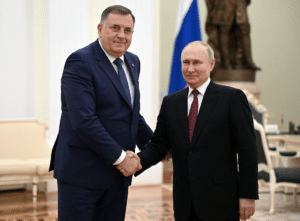
However, concerns have become increasingly realistic since late March 2023, when the government of the Bosnian Serb entity presented a draft law to establish a registry of foreign-funded associations and foundations. The so-called law on ‘foreign agents’ is similar to the one adopted by Moscow in December 2022 and was approved in late September by the Banja Luka National Assembly. In parallel, the process of adopting amendments to the Criminal Code reintroducing criminal penalties for defamation has also advanced. Following the proposal – also in late March – the law entered into force on Aug. 18 and now provides for fines of 5,000 to 20,000 Bosnian marks (2,550 to 10,200 euros) if the defamation occurs “through the press, radio, television, or other public media, during a public meeting, or otherwise.” The European External Action Service (EEAS) and the EU delegation in Sarajevo attacked Banja Luka, highlighting that the two laws “have had a frightening effect on freedom of speech in Republika Srpska.”
The secessionist provocations came hand in hand with the issue of the relationship with Russia after the invasion of Ukraine. As early as September 20, 2022, Dodik traveled to Moscow for a bilateral meeting with Putin after openly provoking Western partners about the illegal annexation of Russian-occupied Ukrainian regions. Provocations that continued at the beginning of January 2023 with the conferral to the Russian autocrat the Order of Republika Srpska (the highest honor of the Serb-majority entity in the Balkan country) – in recognition of “patriotic concern and love” toward Banja Luka’s demands – on the occasion of the Republika Srpska National Day, an unconstitutional holiday under Bosnian law. As if that were not enough, in May 2023, Dodik went on a second trip to Moscow, while in Brussels, misgivings emerged about the Union’s failure to respond with sanctions. EU sources revealed to Eunews that a framework of restrictive measures has existed for some time now ready to be implemented, but Viktor Orbán of Hungary does not allow the green light. Any such foreign policy action requires unanimity in the Council.
Find more insights on the Balkan region in the BarBalkans newsletter hosted by Eunews
English version by the Translation Service of Withub